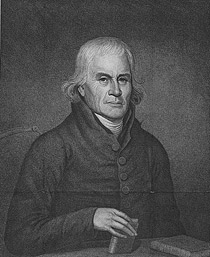

John
Wesley (June 28 June 17, 1703 – March 2, 1791) was an early
leader in the Methodist movement. His brother Charles Wesley
wrote over 9000 hymns and poems. John Wesley died on
Wednesday March 2, 1791, in his eighty-eighth year. As John
Wesley lay dying, his friends gathered around him, Wesley
grasped their hands and said repeatedly, "Farewell,
farewell." At the end, summoning all his remaining strength,
he cried out, "The best of all is, God is with us," lifted
his arms and raised his feeble voice again, repeating the
words, "The best of all is, God is with us."
John was the son of Samuel Wesley, a graduate of Oxford, and
a minister of the Church of England. In 1689 Samuel married
Susanna Annesley, twenty-fourth child of Dr. Samuel Annesley.
Both Samuel and Susanna had been raised in Dissenting homes
before becoming members of the Established Church early in
adulthood. Susanna herself became a mother of nineteen
children. In 1696 Samuel Wesley was appointed rector of
Epworth, where John, the fifteenth child, was born.
The year 1729 is said to be the beginning of the rise of
Methodism. The famous "holy club" was formed by John's
younger brother, Charles Wesley, and some fellow students,
derisively called "Methodists" because of their methodical
habits. The doctrines which Wesley emphasized in his sermons
and writings are prevenient grace, present personal
salvation by faith, the witness of the Spirit, and
sanctification. Prevenient Grace was the theological
underpinnings of his belief that all persons were capable of
being saved by faith in Christ. Unlike the Calvinists of his
day he did not believe that some persons had been elected by
God for salvation and others for damnation. However, he
understood that Christian orthodoxy insisted that salvation
is only possible by the sovereign grace of God. Hence, he
came to express his understanding of humanity's relationship
to God as utter dependence upon God's grace. God was at work
to enable all people to be capable of coming to faith by
empowering humans to have actual existential freedom of
response to God.
.
.
|
|
|
|
|
|
|
|
|
|
|
|
|
|
|
|
....